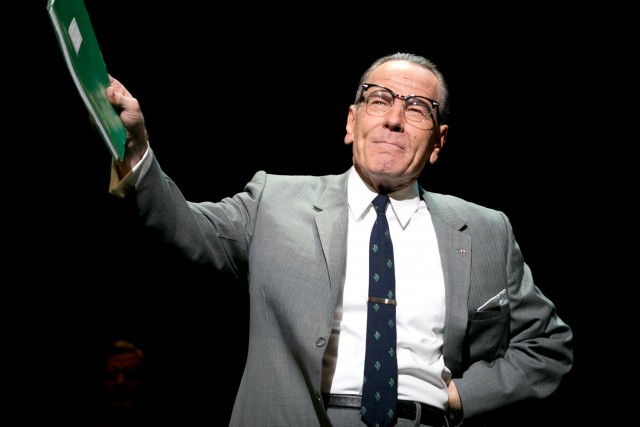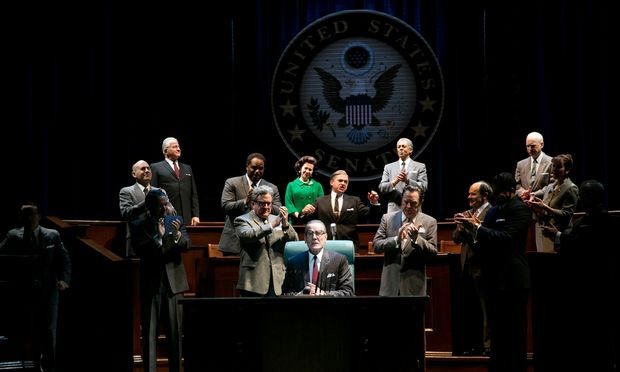
Bryan Cranston gives a rousing performance in Broadway debut as President Lyndon Baines Johnson (photo by Evgenia Eliseeva)
Neil Simon Theater
250 West 52nd St. between Broadway & Eighth Ave.
Tuesday – Sunday through June 29, $35-$155
www.allthewaybroadway.com
Robert Schenkkan’s All the Way has come to Broadway just in time to celebrate the fiftieth anniversary of the passage of the Civil Rights Act of 1964 — as well as to make one pontificate on the recent invalidation of a key part of the Voting Rights Act of 1965. The play begins with one of the most harrowing moments in American history, the assassination of President John F. Kennedy, followed by the swearing-in of Lyndon Baines Johnson (Breaking Bad superstar Bryan Cranston). The Texas politician was a far cry from the Kennedys. In his rousing Broadway debut, Cranston portrays LBJ as a gruff meat-and-potatoes guy who said whatever was on his mind, not afraid to let his pants down, even in front of the press. With his doting wife, Lady Bird (Betsy Aiden), by his side, Johnson decides to make the Civil Rights Act his central focus, much to the chagrin of his mentor, Georgia senator Richard Russell (a stalwart John McMartin). Soliciting support from mild-mannered Minnesota senator Hubert Humphrey (Robert Petkoff), with a promise to make him the vice-presidential candidate, and strong-arm labor leader Walter Reuther (Rob Campbell), Johnson masterfully works both sides of the aisle, knowing how to get things done in ways that already seem impossible today as he deals with FBI director J. Edgar Hoover (Michael McKean), such congressmen as Strom Thurmond (Christopher Gurr), Emanuel Celler (Steve Vinovich), Karl Mundt (Bill Timoney), Robert Byrd (McKean), and Howard “Judge” Smith (Richard Poe), Defense Secretary Robert McNamara (James Eckhouse), and Alabama governor George Wallace (Campbell), who is running against him for the 1964 Democratic nomination. All the while, news about the escalation in Vietnam arrives with chilling regularity.

LBJ is at the center of the battle over the Civil Rights Act in ALL THE WAY (photo by Evgenia Eliseeva)
Pulitzer Prize winner Schenkann’s (The Kentucky Cycle) play is a fireball whenever Cranston, who fully embodies Johnson’s bold proclamations and folksy swagger, is onstage; it slows down significantly when a group of black activists, including SCLC head the Rev. Dr. Martin Luther King, Jr. (Brandon J. Dirden), the Rev. Ralph Abernathy (J. Bernard Calloway), Stokely Carmichael (William Jackson Harper), NAACP executive director Roy Wilkins (Peter Jay Fernandez), and COFO codirector Bob Moses (Eric Lenox Abrams), argue over the all-white Mississippi delegation to the 1964 Democratic National Convention and whether to continue to back Johnson. While the main action takes place, director Bill Rauch keeps various other related parties onstage, sitting in Christopher Acebo’s congressional gallery set, quietly watching Johnson as if they’re part of the audience as well. The majority of the twenty-person cast plays multiple characters, so it’s not always obvious who’s who at any given moment, but in the world of politics, that actually makes sense. Cranston gives a virtuoso performance as Johnson, a man previously portrayed onstage in one-man shows by Laurence Luckinbill and Jack Klugman, but Cranston foregoes mere impersonation, instead embodying Johnson’s inner force and determination. Christopher Liam Moore excels as LBJ’s top aide, Walter Jenkins, who is a kind of worshipful younger version of his boss. “It’s not personal, Dick. It’s just politics,” LBJ tells Russell at one point. “It’s not personal, Dick. It’s just politics,” LBJ tells Russell at one point. In the powerful yet intimate All the Way, it’s often hard to tell the difference.